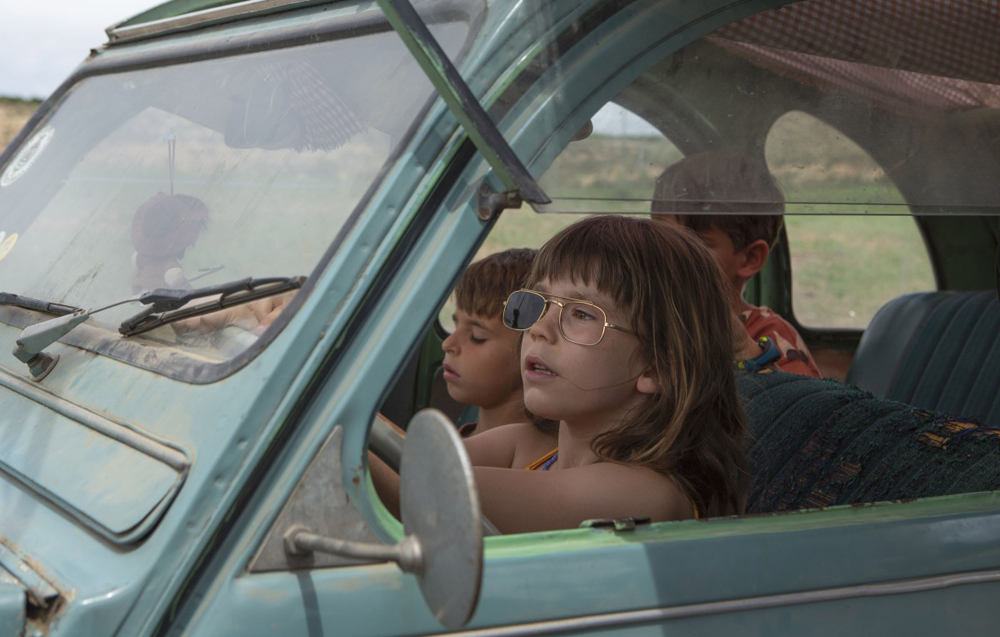For the Solé family at the center of “Alcarràs,” it’s only a minor inconvenience that they can no longer afford the day workers from town to come pick peaches at their orchard in Catalonia. Quimet (Jordi Pujot Dolcet), who has taken over much of the management of the harvest from his aging father Rogelio (Josep Abad), may complain he has to be in the field himself when he’s got more pressing business matters to attend to, but director Carla Simón suggests there’s no place he or anyone else in the tight-knit clan would rather be as three generations convene to load up pallets of produce, passing down stories about the soil they’ve harvested since the Spanish Civil War when they were first offered the land by the Pinyol family as a goodwill gesture for once hiding them.
If they’ve been sustained financially by the farm, the family’s true strength has come from sticking together, with Quimet’s college-aged son Roger (Albert Bosch) still around to lend a hand as well as his wife Dolores (Anna Otin) and their teenage daughter Mariona (Xènia Roset), his brother Cisco (Carles Cabós) and his wife Nati (Montse Oró) raising their two boys Pau and Pere on the property, while his sister Gloria (Berta Pipó) tends to her young daughter Iris (Ainet Jounou). As Simón illuminated in her endearing debut “Summer 1993,” you don’t need much else when you have family, but the Solés have greater issues than being unable to hire help for the summer season after the youngest Pinyol plans to force them off the land if they continue to insist on farming when he believes there is a fortune to be made in solar energy. Rogelio, who had a handshake agreement with Pinyol’s grandfather, can’t fathom such an action, but there’s no contract to speak of when none was ever needed in the past and with all the adults busy with the current crop, the kids find themselves often running back to the house to warn their parents of all the construction trucks coming their way, preparing to set up solar panels.
Simón rarely strays from the Solés’ fields, but “Alcarràs” nonetheless unfolds as a sprawling drama that feels as fresh as the fruit being plucked off the vine, considering the cultural rot that could start making its way inside the family. Whereas “Summer 1993” was built around a single perspective — no easy feat in itself when it was that of a six-year-old girl navigating life in the countryside following her mother’s death — her second moves gracefully between all the members of the family from five-year-olds to septuagenarians, each of whom has a different relationship to the land and different ideas about what the future holds if they come to terms with Pinyol. With some held back by history and others having no attachment at all or even eager to put it behind them, Simón and co-writer Arnau Vilaró have more than enough intrigue within the family dynamics to hold your interest, but goes a step further, masterfully and meticulously expanding the world that Solés inhabit to show the undue pressure placed on all farmers whose goods are regularly devalued by the countries they serve as well as what could be waiting on the other side for young adults Mariona and Roger should they leave the warm cocoon that the family has forged for them.
Although family may not ultimately come first as far as the story’s concerned, it does for Simón, who may have a sharp eye for all her characters’ pecadillos that may drive others up the wall such as Quimet’s stubbornness, Rogelio’s unshakeable belief in old ways of doing business or Pau, Pere and Iris’ mischief-making around the farm, but shrewdly sees those qualities as part of what’s held them together all these years and her gift for getting natural, unaffected performances is largely unrivaled as you feel yourself in the midst of a real bloodline. One can feel the energy in the room as the kids put on a talent show for their elders or a particularly hot summer day leads them all to splash around in the pool and what makes the idea of the Solés being broken apart so tragic is the fact that it feels as you’ve become a part of the family and it’s difficult for yourself to peel yourself away once the end credits start to roll, though mercifully “Alcarràs” waits a while to cut the camera, long enough to ensure they’ll stay with you for some time after.
“Alcarràs” will screen at Berlinale on February 17th at 2:30 pm at Urania, February 19th at 8:30 pm at Berlinale Palast, February 20th at 11 am at Cubix 5 and 6.




